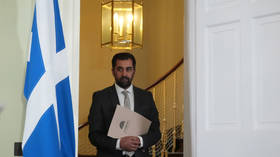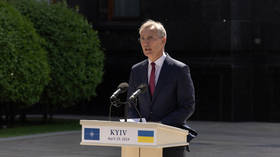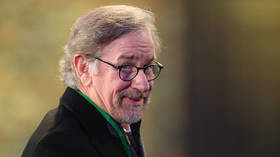Statistics highlight an American empire in decline
The US has long regarded itself as an exceptional nation, a beacon of democracy and progress throughout the world. Yet the statistics don’t exactly match the rhetoric.
Last week, the US slipped to 49th in the world in life expectancy and ranked dead last among developed nations in terms of child well-being. The millions of uninsured Americans left out of America’s increasingly expensive healthcare system show a very different side of the world’s lone superpower.
Just two blocks from the White House, many line up for free food, free blankets and free check-ups from mobile soup kitchens and mobile health trucks.
“This is my 60th year and we’ve just seen the lines grow and grow and grow, and unfortunately it isn’t just homeless people. There is also a new group called the working poor, and because the cost of living is so high, people can’t just meet basic needs,” said Seton Cunneen, a Catholic nun who volunteers with the mobile soup kitchen Martha’s Table. “One of my big worries is that we always used to pride ourselves on having a big middle class, but it seems that the rich are getting richer and the poor are getting poorer.”
Americans’ access to credit and identity as consumers leads them to live far beyond their means, said anthropologist Brett Williams. And rather than be a vehicle for social mobility, higher education in the US only exacerbates the income gap.
“It’s an engine of inequality, because you have to either be wealthy or take on a lot of debt to get an education, and more and more people aren’t willing to do that,” Williams said.
But if Americans are blissfully unaware of their crumbling empire, it’s nothing new, said Robert Jensen.
“There have been empires before this one with illusion, and delusion, of permanence, but they all eventually fell, and of course the United States will be no different. We are seeing the beginnings of that right now,” said Jensen. “That mythology is very useful to people in power because it gives the American people this right to rule.”
Americans believe the US is not supposed to be near the bottom of rankings for positive indicators, yet the nation continues to be. Americans are generally confident in their nation, believing everyone has equal access in the world’s best quality of life, indicated author and activist David Swanson.
He explained that American newspapers and media outlets write all about positive American stories America, but not about negative topics. Nor do they report what other countries do right.
“Our media doesn’t give us that information and so we don’t learn,” said Swanson.
The US spends the most money in the world on healthcare, but is still 49th in life expectancy.
“The dominant factor being simply the incredible inefficiency of our healthcare system,” added Swanson. “This would have been a useful debate to have when we were doing healthcare reform in Washington, and yet it never happened.”
American leaders often boast that other nations depend on US, that the US is a global problem solver. However, the US is unable to solve its own problems at home.
The US superpower image is diminishing as the nation enters a decline. China and Europe however are expanding.
“I think China may be a bit overblown, but the European Union is bigger and stronger economically than the United States,”said Swanson. “It’s a model for development that is ahead of the United States.”












